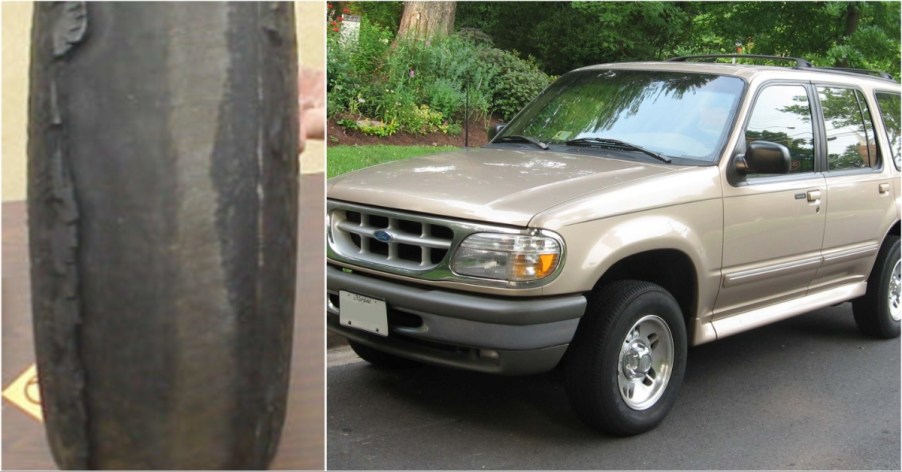
15 Of The Biggest Vehicle Recalls Ever

Safety is a top priority for drivers and passengers when it comes to cars. Yet, some of the most trusted vehicles can become a source of a few critical flaws, which leads to shocking recalls. These incidents not only raise eyebrows but also raise conversations about accountability and consumer trust in the industry. Swipe through to read through 15 of the biggest cases yet.
Takata Airbag Recall (Multiple Manufacturers)

The largest automotive recall in history is the Takata Airbag Recall. It affected over 100 million vehicles from manufacturers such as Honda, Toyota, and Ford. It stemmed from defective airbags that had the potential to explode and cause injury to passengers, and has been directly associated with over 400 injuries, according to the NHTSA.
Ford Cruise Control Recall

Between 1999 and 2021, Ford faced challenges with the Cruise Control Recall, which affected around 14.3 million vehicles, as stated by Lieffcabraser.com. Multiple Ford models were plagued, and these defective cruise control switches posed a grave risk because they could ignite fires even when the vehicle was turned off.
Volkswagen Diesel Emissions Scandal

In 2015, Volkswagen was in the middle of a case where they were caught cheating emissions tests with software installed in 11 million vehicles worldwide. As a result, as highlighted by Wikipedia, Volkswagen faced billions of dollars in fines and significant damage to its reputation.
General Motors Ignition Switch Recall

General Motors made headlines in 2014 with its recall due to defective ignition switches. These faulty switches could unexpectedly turn off the engine while driving and disable critical safety features like airbags. Tragically, the defect was linked to 124 casualties, as reported by Wikipedia. Nearly 30 million vehicles were recalled.
Toyota Unintended Acceleration Recall

With around 9 million cars globally called back and over 1$ billion in fines and settlements, as highlighted by Wikipedia, Toyota found itself in hot water between 2009 and 2011 with its unintended acceleration recall. The issue involved accelerator pedals that could become stuck and cause vehicles to accelerate uncontrollably.
Ford Ignition Switch Recall

In 1996, Ford recalled some cars because of faulty ignition switches. Affecting 8.7 million vehicles, this defect had a frightening consequence: it could cause vehicles to combust spontaneously, even when parked. The recall covered a range of Ford models and remains one of Ford’s largest recalls.
Firestone Tire Recall

The Firestone Tire Recall of 2000 was a disaster for both Ford and Firestone. Involving 6.5 million tires, many of which were installed on the popular Ford Explorer, the tires were prone to tread separation, which caused dangerous rollover accidents. The recall highlighted the dangers of inadequate product testing.
Jeep Grand Cherokee and Liberty Fuel Tank Recall

In 2013, Jeep’s Grand Cherokee and Liberty models were recalled due to fuel tanks positioned too close to the rear bumper, making them susceptible to fires in rear-end collisions. A total of 1.56 million vehicles were affected, and the defect was linked to at least 50 casualties.
Ford Pinto Recall (1978)

One of the earliest recalls occurred in 1978 when Ford was forced to recall 1.5 million Pinto vehicles due to a design flaw in the fuel tank. According to Pisanchyn Law, the Pinto’s gas tank was prone to rupturing in rear-end collisions, which led to fires and explosions.
Ford Gear Shifting Recall

Ford announced another significant recall in 2022 that involved over 2.9 million vehicles due to a problem with the gear shifter cable bushing. This issue prevented vehicles from staying in ‘Park.’ The defect affected six Ford models built between 2013 and 2019 and caused considerable concern among owners.
Takata Seatbelt Recall

The Takata Seatbelt Recall, which began in 1995, affected several major automakers, including Honda and Mitsubishi. 11 different manufacturers were affected, which made it a wide-reaching safety concern. Faulty models, including the Takata 52X and A7X seatbelts, forced automakers to take immediate action to replace the fault.
Honda Accord Transmission Recall

Due to safety concerns, Honda initiated a call-back in 2004 that affected more than a million vehicles, with the Accord being the most affected model. To remedy the situation, Honda provided two options based on the vehicle’s mileage: installing a new ATF oil jet kit or completely replacing the transmission.
BMW water Pump Recall

Defective water pumps triggered a BMW recall in 2024. Over 72,000 vehicles were affected by several incidents that prompted swift action from the manufacturer. The issue involved electric auxiliary water pumps that had the potential to overheat and start fires in the engine compartment, as reported by the NHTSA.
Toyota Window Switch Recall

Once again in 2015, Toyota announced another recall for faulty window switches that posed a fire risk due to potential short-circuiting. Incompliance Mag reports that a U.S. customer experienced a hand burn from a melting switch, with Toyota being aware of 11 incidents where switches and door trims burned.
Chevrolet Motor Mount Recall

Chevrolet initiated one of its largest call-backs in 1971, which involved 6.7 million vehicles due to defective engine mounts. Faulty mounts could break free, causing the engine to rise under load, which posed a danger to drivers. Several popular Chevrolet models, including the Camaro and a range of pickup trucks, were affected.


